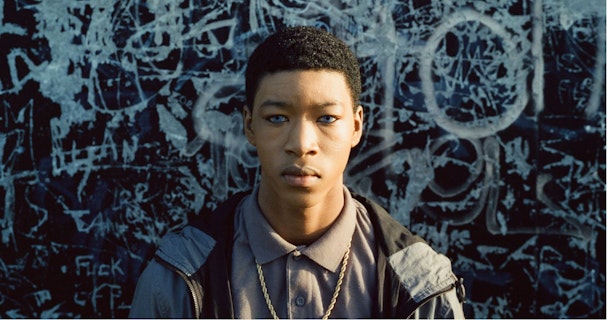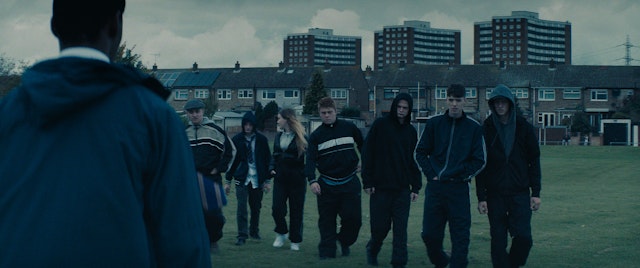How The Guardian built an Oscar-nominated documentary studio inside its news business
The Guardian is up for an Oscar this weekend for a haunting film that features sickening scenes of racial violence and reduced the head of Guardian Documentaries to tears.

/ The Guardian/Lightbox
“It made me cry the first time I watched it, I had this amazing emotional reaction,” says Charlie Phillips, recalling his response to Black Sheep. “If I, as this hardboiled commissioner watching this at my desk was getting this reaction, which I haven’t had to many films ever, I thought people are going to really (respond) to this.”
Black Sheep is a 26-minute depiction of the experience of a black London schoolboy who was moved to the suburbs by his parents for his safety but became a target for white youths. The film – nominated for best short documentary – is especially powerful because it is told through the deeply introspective words of its subject, Cornelius Walker, who resorted to bleaching his skin and wearing blue contact lenses in an attempt to win acceptance from his persecutors.
When some sections of the media gratuitously use race and immigration stories to provoke reaction online, this recognition by the Academy Awards of the quality and sensitivity of Black Sheep is a measure of The Guardian’s growing stature as a documentary platform. It should give confidence to traditional newspaper organisations that they can host ambitious film projects.
From startup to Oscar-nominee
In less than four years since its foundation in 2015, Guardian Documentaries has made 38 shorts. It won an Emmy nomination for Battle for Mosul, its frontline reportage of Iraq’s liberation from ISIS, and a Grierson Award for Fish Story, a bizarre caper involving people with fish-related surnames. It has covered gender-fluidity in small town Mexico (Muxes) and sex trafficking inside American women’s prisons (last year’s The Trap).
But its pinnacle so far is Black Sheep’s nod at the Oscars. “It’s a really big moment in global recognition of the brand of Guardian Documentaries, and it’s something that we have been working towards for a few years,” says Phillips, who established the doc unit at The Guardian’s Kings Place offices in London after joining the news publisher from Sheffield International Documentary Festival (known as Doc/Fest).
He will be at Hollywood’s Dolby Theatre for Sunday’s ceremony, with Walker and Black Sheep’s director Ed Perkins. The film was produced by Simon Chinn (who won documentary Oscars for Man on Wire and Searching for Sugar Man) and his cousin Jonathan Chinn, the founders of Lightbox, one of many outside production partners used by Guardian Documentaries.
Black Sheep – which includes several sequences of reconstruction – is not a conventional documentary and its approval from genre purists was never a given. Phillips’s confidence took a wobble when it was rejected by Sundance and other prestigious festivals. “It was quite odd really. We thought Black Sheep was the best thing we had ever done and then it didn’t get into a couple of festivals and we were very puzzled.” Its breakthrough came at last year’s Doc/Fest, with an award and rave reviews for its tackling of complex subject matter.
“The more I watched it the more I saw it was about a lot more than race, that it was about relationships with your parents and trying to find your identity as a teenager, and a social history of Britain in the early 2000s,” Phillips says. “It felt like there were all these inter-cutting themes that were very relevant to now.”
By commissioning and hosting Black Sheep, The Guardian finds itself broadcasting on its website the N-word and other racial slurs. Guardian Documentaries has ventured into similar territory before, such as when it made 2017’s The Internet Warriors to explore the backgrounds of social media trolls. The film, which emerged from a four-year project by Norwegian photographer-filmmaker Kyrre Lien, gave a platform to unashamed homophobes, Islamophobes and a man called Robert from the UK, who complained about the Home Office’s treatment of his immigrant partner, while saying of refugees: “Run the fuckers over.”
Phillips believes that the Guardian’s editorial position gives it the credibility to present such views without causing offence. “You could say that we put out a film that has a lot of offensive material in it but because we are the Guardian people know we are not just going to put out an Islamophobic film.”

He hopes the Oscar nomination for Black Sheep will persuade more directors and platforms (from broadcasters to streaming platforms such as Netflix) to make film projects with a news brand that began as The Manchester Guardian in 1821, 101 years before the birth of the BBC. “Big filmmakers [will see] that you could do a film for us and this could lead you to getting nominated for awards as well as getting loads of attention through The Guardian,” he says. “There’s that possibility that it may open the doors to being able to co-produce with other platforms and networks.”
He has ambitions to look beyond one-offs and commission the strand’s first series. “We are doing it quite cautiously because series will obviously be more expensive than doing a one-off. If we are going to do it, it will probably be something based around our in-house journalism… like a big investigation or a big story that’s cooking away.”
When Phillips started Guardian Documentaries in 2015, he produced a video saying he was looking for “very contemporary” stories told in “up to 15 minutes”, which he described as “people’s attention span online”. He has now revised that range to 15-30 minutes.
This move towards longer-form video mirrors what some other news publishers are doing on Facebook Watch and YouTube, but Phillips says it is wrong to assume that Guardian Documentaries are viewed on phones. “More people are watching things on mobile [but] I also think more people are watching stuff through smart TVs and Playstation; more people are hooking up their laptop to a projector in their living room,” he says. “You have this move towards people watching more on bigger screens and making that distinction between your phone, where you might watch two or three minutes, and your bigger screen, which could be a desktop computer, where you might make an appointment to view slightly longer pieces.”
The popularity of Netflix and other streaming services has blurred distinctions about how documentaries are consumed. “If you were to ask someone ’Is Netflix TV or an online platform?’ they might struggle to answer - because they probably watch it through their TV but it is delivered online. That ambiguity in how people consume media on bigger screens will work to our benefit.”
In-depth factual filmmaking is no longer the exclusive domain of traditional broadcasters, he says. “We benefit so much from the emergence of Netflix and Amazon and Hulu, where it’s no longer only TV networks or big studios that are responsible for ambitious documentaries. We are part of that wave of alternative platforms that people are excited about.”
What documentaries do for The Guardian
A traditional newspaper organisation would once have been an interloper in this world but Phillips credits the pioneering of the New York Times, which launched Op-Docs (short for “opinionated documentaries”) in 2011. “That strand really blazed the trail in showing the industry that a news organisation could be doing quality documentaries,” he says.
Guardian Documentaries has been more experimental than Phillips imagined when the strand launched. “We are able to be quite visually and aesthetically ambitious in the kind of work we do and as long as people feel it’s rooted in Guardian purpose, ie it has got some kind of social, political or journalistic roots to it, then they are quite willing to watch stuff that is maybe pushing the boundaries visually or orally,” he says. “I wouldn’t have been as confident saying that in 2015.”
He cites as examples Skip Day, a 15-minute “purely observational” film about Florida teens missing classes to spend a day on the beach, and Little Pyongyang, a “very stylised treatment” of the life of a North Korean refugee. Both titles were packaged with Black Sheep for cinema screenings which The Guardian held in London, New York and Los Angeles to raise the profile of its documentary work.
This is partly an exercise in raising The Guardian’s international profile.
The immediate commercial value of Guardian Documentaries isn’t obvious. The films carry pre-roll advertising (currently for The Lego Movie 2) and some projects will justify buying distribution rights for sale to broadcasters, airlines and educational platforms. “I think that is a nascent market,” says Phillips.
Many projects are underwritten by partners, such as Bertha Foundation (created by South African social justice philanthropist Tony Tabatznik), which committed to a set of 12 films, including The Internet Warriors. The doc unit It has also worked with Guardian Labs, the paper’s in-house content marketing studio, to make brand-funded documentaries.
But Phillips sees a “more ambient impact” by which Guardian Documentaries benefits Guardian News & Media and its hopes of breaking even in this financial year (a target it is likely to narrowly miss). He says the films are popular with Guardian “Members” (an increasingly important revenue strand for the paper, whereby readers pay £49-£149 a year to support the editorial mission and be invited to live events). There are plans to do more exclusive documentary screenings for members.
“To get people to sign up as members and to maintain being supporters it is good to show them that we are doing ambitious projects like the documentaries,” says Phillips. “Although I can’t say someone watched Black Sheep and immediately signed up as a supporter, the feedback we get is that people like seeing ambitious work. It’s part of the overall package that makes people feel that they get amazing value for money by being a Guardian supporter.”
If Black Sheep gets the gong that ambient impact should be greater still.
Read more from Ian Burrell's column, The News Business, and follow him on Twitter @iburrell. You can watch the Oscar-nominated Black Sheep below, but please note this film does contain language some viewers may find offensive and viewer discretion is advised.
